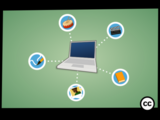
- Author:
- Shawn Lee
- Liz Crouse
- Date Added:
- 06/07/2020

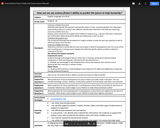
Students will learn the potential costs and benefits of social media, digital consumption, and our relationship with technology as a society in the three-week lesson. This inquiry based unit of study will answer the following questions:
Essential Question: How can we use science fiction’s ability to predict the future to help humanity?
Supportive Questions 1: What predictions of future development has science fiction accurately made in the past? This can include technology, privacy, medicine, social justice, political, environmental, education, and economic.
Supportive Question 2: What predictions for future development in contemporary science fiction are positive for the future of humanity? What factors need to begin in your lifetime to make these predictions reality?
Supportive Question 3: What predictions for future development in contemporary science fiction are negative for the future of humanity? What factors need to begin in your lifetime to stop these negative outcomes?
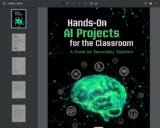
This guide provides student-driven projects that can directly teach subject area standards in tandem with foundational understandings of what AI is, how it works, and how it impacts society. Several key approaches were taken into consideration in the design of these projects. Understanding these approaches will support both your understanding and implementation of the projects in this guide, as well as your own work to design further activities that integrate AI education into your curriculum.
Project 1: AI Chatbots
Project 2: Developing a Critical Eye
Project 3: Using AI to Solve Environmental Problems
Project 4: Laws for AI
Visit the ISTE website with all the free practical guides for engaging students in AI creation: https://www.iste.org/areas-of-focus/AI-in-education
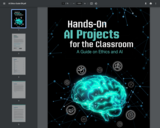
In this guide, students’ exploration of AI is framed within the context of ethical considerations and aligned with standards and concepts, and depths of understanding that would be appropriate across various subject areas and grade levels in K–12. Depending on the level of your students and the amount of time you have available, you might complete an entire project, pick and choose from the listed activities, or you might take students’ learning further by taking advantage of the additional extensions and resources provided for you. For students with no previous experience with AI education, exposure to the guided learning activities alone will create an understanding of their world that they likely did not previously have. And for those with some background in computer science or AI, the complete projects and resources will still challenge their thinking and expose them to new AI technologies and applications across various fields of study.
Project 1: Fair's Fair
Project 2: Who is in Control?
Project 3: The Trade-offs of AI Technology
Project 4: AI and the 21st Century Worker
Visit the ISTE website with all the free practical guides for engaging students in AI creation: https://www.iste.org/areas-of-focus/AI-in-education.

This collection of lessons represent adapted and remixed instructional content for teaching media literacy and specifically civic online reasoning through distance learning. These lessons take students through the steps necessary to source online content, verify evidence presented, and corroborate claims with other sources.
The original lesson plans are the work of Stanford History Education Group, licensed under CC 4.0. Please refer to the full text lesson plans at Stanford History Education Group’s, Civic Online Reasoning Curriculum for specifics regarding background, research findings, and additional curriculum for teaching media literacy in the twenty-first century.

This social media literacy unit introduces students to foundational skills in analyzing images and social media posts. It also reenforces critical thinking questions that can be applied to various forms of media. This unit was taught to 9th grade students but is easily adaptible to a range of secondary classrooms. It was also taught in conjunction with another unit focused on social media platforms and content.

This unit engages students in a variety of activities that analyze and reflect on the role of social media in our everyday lives. This includes options for collaborative group work, reading nonfiction articles, a design challenge and presentations to communicate ideas. The unit also includes a formal writing assessment option that aligns with the Common Core State Writing Standards. Activities can be adapted or combined in a variety of ways to support student reflection and analysis. These lessons were piloted in 9th grade English classes but are suitable or a range of secondary students.

The internet is full of false information and ads. Sometimes it can be challenging to decipher the validity of content. It is important to learn how to critically evaluate online material for several reasons: you want to know what type of information is trustworthy online, you want to be an informed digital citizen, and you want to ensure that the information that you are using for a school assignment is factual. The purpose of “Two Truths and a Lie Online” is to teach you how to critically evaluate online resources so that you can be both an informed consumer and producer of digital content.
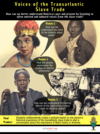
This unit begins by asking students to consider life in Africa before colonization and the forced enslavement of Africans. Students read Omar ibn Said’s autobiography to understand the Islamic scholar’s experiences before he was captured in West Africa and after he was enslaved in America. Excerpts from Olaudah Equiano’s autobiography provide a detailed glimpse of his childhood in Africa before he was kidnapped and sold into slavery. Students examine these two stories and others for evidence of resistance, liberation, connection to culture, and shared humanity as they develop a response to the question: How can we better understand America’s past and present by listening to often omitted and unheard voices from the slave trade? Working in teams, students create a podcast about an unheard story in order to start a conversation about the lasting effects of the Transatlantic slave trade and the importance of Black history in America.

Students will look at social medias and what identities are crafted in those formats, both for social media celebrities and their own digital footprints. This lesson is part of a media unit curated at our Digital Citizenship website, "Who Am I Online?"